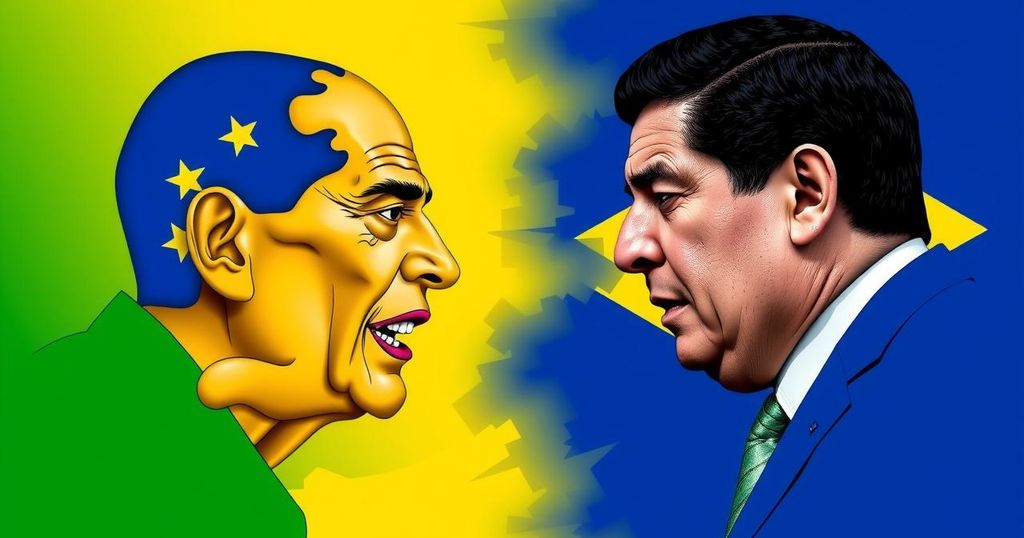Rising Tensions: Brazil’s Veto of Venezuela’s BRICS Membership and Its Implications
The BRICS summit in Kazan, Russia, highlighted rising tensions between Brazil and Venezuela following Brazil’s veto of Venezuela’s entry into BRICS. Brazil did not provide a public justification for this decision, which Venezuela condemned as hostile and meddlesome. Diplomatic relations between the two nations have been strained by the political controversies surrounding Venezuela’s recent elections, and both countries now face a delicate path in negotiating future engagement amidst the backdrop of potential shifts in regional dynamics.
The recent BRICS summit held in Kazan, Russia, witnessed escalating diplomatic tension between Brazil and Venezuela, ignited by Brazil’s decision to veto Venezuela’s accession as a partner state in the bloc. This action has compounded the already strained relations following the re-election of Nicolás Maduro as Venezuela’s president. Notably, the Brazilian government did not publicly articulate a rationale for the veto. President Lula da Silva was absent from the summit due to a domestic incident, delegating the task to Foreign Minister Mauro Vieira. Neither he nor President Lula provided any explanation concerning the veto, prompting Caracas to express outrage and label the act a betrayal of trust, denouncing it as Brazilian intervention in Venezuela’s internal affairs. Diplomats noted that Brazil’s adverse stance stemmed from the contentious nature of the recent Venezuelan elections and its implications on bilateral relations, particularly concerning the historical ties between Maduro’s government and Brazil’s Workers’ Party. Venezuela’s elections have come under criticism due to allegations of fraud, with the opposition contesting the results. Brazil’s Foreign Ministry has maintained a position of trust in Venezuela’s electoral process, initiating dialogues with Colombia to address Venezuela’s election results’ transparency, which has yet to be validated by the National Electoral Council three months subsequent to the elections. Meanwhile, Caracas has boldly insisted on respecting its sovereignty and self-determination, advocating for resolution of electoral disputes internally. The Venezuelan Foreign Ministry accused Brazil of enacting a continuation of former President Jair Bolsonaro’s antagonistic policies towards Venezuela, branding the veto as an expression of “hatred, exclusion, and intolerance.” Maduro publicly criticized the veto while asserting that Brazil promised not to obstruct Venezuela’s entry into BRICS during informal discussions with Vieira at the summit. Internally, Venezuela has directed its discontent towards diplomat Eduardo Paes Saboia, pointing to his ties with Bolsonaro’s administration. The Venezuelan government has expressed its anticipation of President Lula’s forthcoming position on this matter, deliberating whether Saboia’s actions represent a continuity of Bolsonaro’s sentiments. Analysts argue that blaming Saboia is a diplomatic strategy to convey dissatisfaction while keeping avenues for dialogue open. Some Venezuelan commentators perceive Brazil’s veto as a deviation from Lula’s earlier administrations, asserting that it contradicts his previously established regional integrative vision and progressive ideals. The contentious environment has rendered future negotiations tenuous. Brazil’s diplomatic approach now aims to allow time for deliberation and observe the subsequent actions of the Venezuelan government while maintaining existing diplomatic channels. There is a collective acknowledgment that defeating the veto, especially given Brazil’s presidency of BRICS slated for 2025, will be critical for enhancing cooperation and resolving disputes. Additionally, the potential benefits of Venezuela’s vast oil reserves—amounting to approximately 303 billion barrels—pose significant stakes for both BRICS and Caracas’ geopolitical presence, especially considering BRICS’ current role in global energy provision. Amidst these developments, even Russian President Vladimir Putin has openly disagreed with Brazil’s veto, underscoring potential divides among BRICS members regarding consensus in decision-making processes. As Brazilian and Venezuelan relations navigate this complex diplomatic landscape, the objective of fostering cooperation remains fraught with challenges, emphasizing the need for careful, strategic dialogue and reconsideration of diplomatic stands when addressing critical issues.
The diplomatic relationship between Brazil and Venezuela has historically been fraught with tension, particularly following the contentious re-election of Nicolás Maduro as President of Venezuela. The Brazilian government’s recent veto against Venezuela’s bid for BRICS membership follows a pattern of distrust and criticism regarding the legitimacy of Venezuela’s electoral processes. This relationship was previously affected by the divergent ideologies of the Bolsonaro administration and the Workers’ Party’s governing philosophies under Lula. The background of contested elections, strained bilateral relations, and the evolving geopolitical landscape in Latin America provides essential context for understanding the ongoing diplomatic fallout following the BRICS veto.
In summary, the veto of Venezuela’s entry into BRICS by Brazil has exacerbated existing tensions between the two countries, highlighting the complex interplay of domestic politics, historical grievances, and geopolitical strategies. Brazil’s decision not to formally explain the veto, amidst a backdrop of contested elections in Venezuela, reflects significant diplomatic rifts that demand careful navigation to foster future cooperation. As both countries sit on the precipice of potential reconciliation or further discord, the coming months will be critical in determining the trajectory of their bilateral relations and regional integration efforts in Latin America.
Original Source: www.brasildefato.com.br




Post Comment